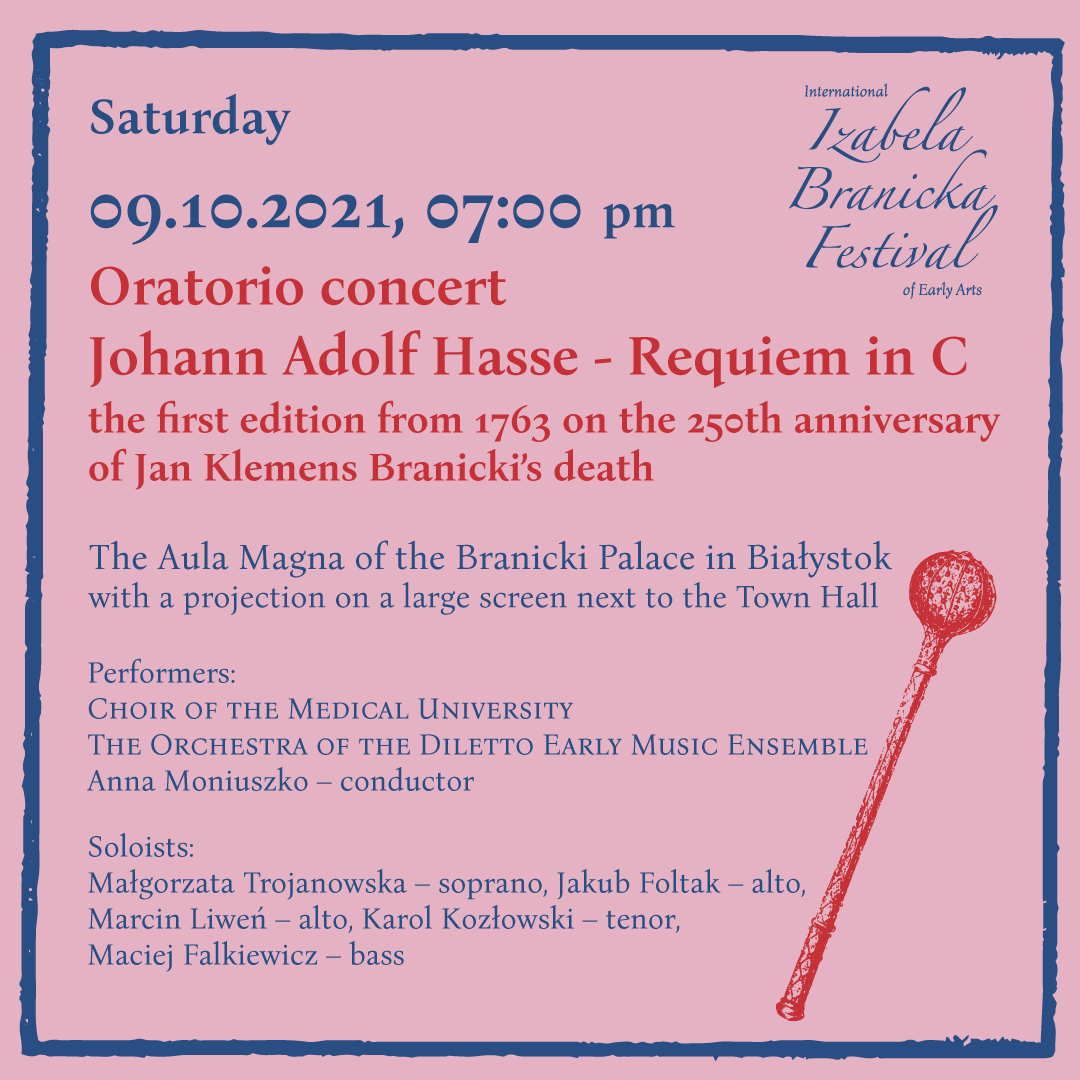Watch on-line:
Performers:
- Choir of the Medical University and the Orchestra of the Diletto Early Music Ensemble conducted by Anna Moniuszko
- Soliści: Małgorzata Trojanowska – sopran, Jakub Foltak – alt, Marcin Liweń – alt, Karol Kozłowski – tenor, Maciej Falkiewicz – bas
Event description:
2021 is the 250th anniversary of the death of Jan Klemens Branicki, husband of Izabela Branicka. The Białystok councillors have established this year as Jan Klemens Branicki’s year. Therefore, the references to this very important event in Izabela Branicka’s life and reminders of the person and merits of the owner of Białystok, Hetman Jan Klemens Branicki, cannot be missed during the Izabela Branicka Festival of Early Arts. He contributed to the development of Białystok in an unparalleled way, led to the renewal of its charter in 1749, and the family's palace is still a tourist symbol of the capital of Podlaskie Voivodeship. He was the last male representative of the Branicki family of the Gryf coat of arms, called the richest magnate of the Commonwealth. He owned 12 cities, 257 villages and 17 palaces. He was also a patron of culture together with Izabela Branicka. The Opernhaus built by him was one of the most famous buildings in Poland. A ballet group and an orchestra operated in the Opernhaus until the Hetman's death,
Due to this special circumstance, we will start the festival on 9 October on the anniversary of Jan Klemens Branicki’s death with the performance of Requiem in C by Johann Adolf Hasse. The work was not chosen accidentally. It has truly royal splendour, because it was performed during the funeral of the last king of Poland from the Wettin family - Augustus III the Saxon, whose ardent supporter was the Grand Hetman of the Crown, Jan Klemens Branicki.
Johann Adolf Hasse was a conductor for 30 years at the courts of August II the Strong and August III - the Saxon electors, and, at the same time, the successive Polish rulers. This fact represents the source of the composer's interest in Polish music, to which he often refers in his works: in his compositions, we can find fragments with the words alla polacca or arie nel gusto polacco. Hasse also visited Warsaw many times. There, in the years 1758–1762, the Dresden ensemble accompanying the king performed the 12 operas composed by him. There are indications that Hasse, while being with the court of Augustus III in Warsaw, also visited the Branicki Palace in Warsaw and Białystok, where he was hosted by the second person after the king in the country - the Great Crown Hetman Jan Klemens Branicki. Due to the connections with the royal orchestra of the concertmaster of Branicki's band - Antoni Kossołowski (Kozłowski), it is likely that Hasse's works were also performed at the Opernhaus in Białystok.
J.K. Branicki died in Białystok on 9 October 1771. He was buried in the Church of Saints Peter and Paul in Kraków. Thanks to the foundation of his wife Izabela in 1778, a tombstone of the hetman was erected in the old parish church in Białystok. It contains an urn with Branicki's heart. The performance of the royal Requiem will be a worthy expression of gratitude and a kind of tribute to the builder of Białystok by its contemporary inhabitants.
Koncert będzie otwarty dla publiczności ze wstępem wolnym a także, aby zwiększyć zasięg będzie transmitowany i wyświetlony na telebimie umieszczonym przed Ratuszem na Rynku Kościuszki z możliwością obejrzenia przez spacerujących melomanów.

